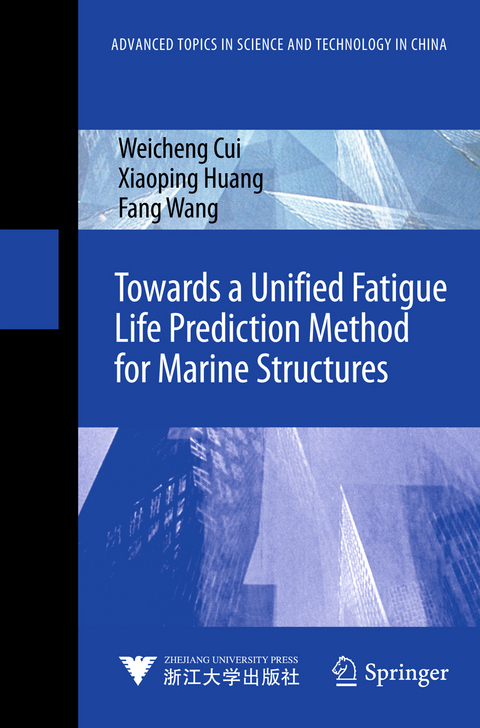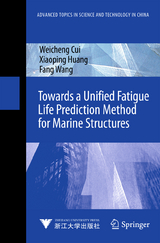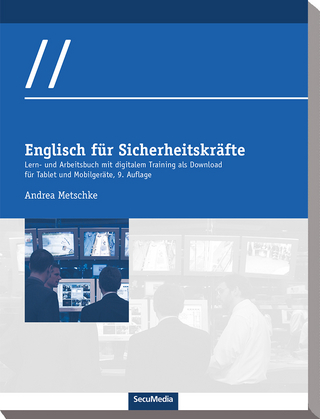Towards a Unified Fatigue Life Prediction Method for Marine Structures
Seiten
2014
|
2014
Springer Berlin (Verlag)
978-3-642-41830-3 (ISBN)
Springer Berlin (Verlag)
978-3-642-41830-3 (ISBN)
In order to apply the damage tolerance design philosophy to design marine structures, accurate prediction of fatigue crack growth under service conditions is required. Now, more and more people have realized that only a fatigue life prediction method based on fatigue crack propagation (FCP) theory has the potential to explain various fatigue phenomena observed. In this book, the issues leading towards the development of a unified fatigue life prediction (UFLP) method based on FCP theory are addressed. Based on the philosophy of the UFLP method, the current inconsistency between fatigue design and inspection of marine structures could be resolved.
This book presents the state-of-the-art and recent advances, including those by the authors, in fatigue studies. It is designed to lead the future directions and to provide a useful tool in many practical applications. It is intended to address to engineers, naval architects, research staff, professionals and graduates engaged in fatigue prevention design and survey of marine structures, in fatigue studies of materials and structures, in experimental laboratory research, in planning the repair and maintenance of existing structures, and in rule development. The book is also an effective educational aid in naval architecture, marine, civil and mechanical engineering.
Prof. Weicheng Cui is the Dean of Hadal Science and Technology Research Center of Shanghai Ocean University, China. Dr. Xiaoping Huang is an associate professor of School of Naval Architecture, Ocean and Civil Engineering of Shanghai Jiao Tong University, China. Dr. Fang Wang is an associate professor of Hadal Science and Technology Research Center of Shanghai Ocean University, China.
This book presents the state-of-the-art and recent advances, including those by the authors, in fatigue studies. It is designed to lead the future directions and to provide a useful tool in many practical applications. It is intended to address to engineers, naval architects, research staff, professionals and graduates engaged in fatigue prevention design and survey of marine structures, in fatigue studies of materials and structures, in experimental laboratory research, in planning the repair and maintenance of existing structures, and in rule development. The book is also an effective educational aid in naval architecture, marine, civil and mechanical engineering.
Prof. Weicheng Cui is the Dean of Hadal Science and Technology Research Center of Shanghai Ocean University, China. Dr. Xiaoping Huang is an associate professor of School of Naval Architecture, Ocean and Civil Engineering of Shanghai Jiao Tong University, China. Dr. Fang Wang is an associate professor of Hadal Science and Technology Research Center of Shanghai Ocean University, China.
Current understanding of fatigue mechanisms of metals.- Description of fatigue loading.- General procedure for a unified fatigue life prediction (UFLP) method for marine structures.- Technical problems to be resolved for developing a UFLP.- Some applications & demonstrations of UFLP.- Code development based on UFLP for marine structures.
| Erscheint lt. Verlag | 7.3.2014 |
|---|---|
| Reihe/Serie | Advanced Topics in Science and Technology in China |
| Zusatzinfo | XI, 281 p. |
| Verlagsort | Berlin |
| Sprache | englisch |
| Maße | 155 x 235 mm |
| Themenwelt | Technik |
| Schlagworte | ATSTC • Fatigue Crack Propagation • Fatigue Life Prediction • Load Sequence Effect • marine structures • Unified Approach • ZJUP |
| ISBN-10 | 3-642-41830-9 / 3642418309 |
| ISBN-13 | 978-3-642-41830-3 / 9783642418303 |
| Zustand | Neuware |
| Haben Sie eine Frage zum Produkt? |
Mehr entdecken
aus dem Bereich
aus dem Bereich
Lern- und Arbeitsbuch (mit digitalem Training zum Downloaden)
Buch (2024)
SecuMedia (Verlag)
CHF 43,95
Praxiswissen zu Schimmelpilzschäden in Gebäuden: Mikrobiologie, …
Buch | Hardcover (2024)
Reguvis Fachmedien (Verlag)
CHF 138,60




